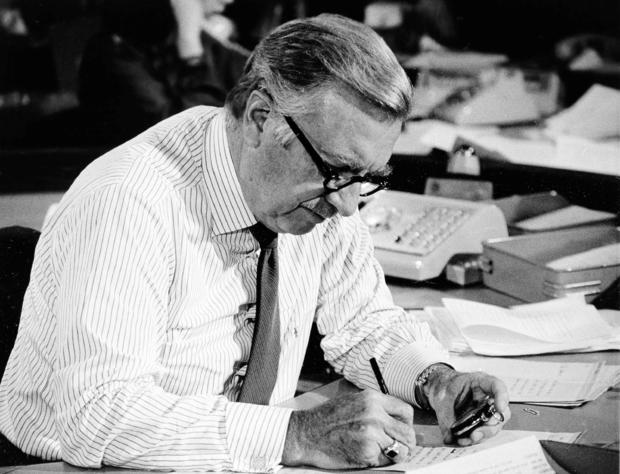Iconic Newsmaker #6: Walter Cronkite
Possibly the most beloved and trusted voice ever to deliver the evening news, Walter Cronkite was heralded for his level-headed, just the facts approach to reporting. Free of personal agenda and unwilling to sway the audience toward his own opinion, Cronkite's humanity always came shining through. A lifelong newsman best known for anchoring the "CBS Evening News" for 19 years, this is how a Missouri native became the voice of New York and the conscience of America.
⇒Complete 1010 WINS Iconic New York Series⇐
A Simple Start in a Simple Place
Walter L. Cronkite, Jr. was born in St. Joseph, MO in 1916. The family headed by his dentist father Walter Cronkite Sr., moved to Houston, TX when he was 11 years old. There, his value system was shaped in part by his involvement with the Boy Scouts. His interests also started to turn to journalism. Cronkite was editor of his high school newspaper and worked on the University of Austin's campus newspaper when he was a student there. Cronkite dropped out of college to seek employment and entered the world of radio, where he was a broadcaster and sports announcer. Known on air as Walter Wilcox, Cronkite left the radio world behind to join the United Press as a foreign correspondent in 1937.
The War Years
Cronkite's no nonsense reporting and commitment to a level headed understanding of the facts gained him prominence and notoriety during WWII. As chief United Press correspondent, he covered the European front from the battlefields throughout the continent and North Africa. He was one of a select group of news reporters to participate in bombing raids over Germany as part of a group called the "Writing 69th." Cronkite was trained to fly and even shot a machine gun at a German fighter during battle. His cover of the post-war Nuremberg trials riveted the American public.
The Most Trusted Man in America
Cronkite joined CBS News in 1950. Over the next decade, he covered electoral campaigns, political conventions and other stories for a number of on-air programs. In 1962, he joined the "CBS Evening News," which would become the first daily, half-hour news program a year later. There he would remain as anchor until his last broadcast 19 years later.
Cronkite's persona changed over the years from valued friend, to trusted father and finally to honored grandfather. As time marched on, his rock solid honesty and commitment to truth was never wavering. Voted "The Most Trusted Man in America" in an Oliver Quayle poll in 1972, Cronkite shepherded the nation through Watergate and the Vietnam War. Cronkite traveled to Vietnam to witness firsthand the effects of years of war. He is said to have been pivotal to a sea of change in public opinion about the war and instrumental in its ending.
Among Cronkite's most famous reports were his in-depth and long term coverage of the Iran hostage crisis, the Three Mile Island nuclear power accident, the assassination of Martin Luther King, Jr. and the first U.S. Moon landing. Cronkite's fascination with space exploration was well known and accented by his boyish on-air enthusiasm during newscasts about the space race. To date, he is the only non-NASA recipient of a Moon Rock Award.
Intrinsically linked to the White House and political reporting, it fell on Cronkite to break the news of John F. Kennedy's assassination to the American public. Completely poised and professional, a visibly emotional Cronkite removed his glasses during the report in an iconic gesture which would become symbolic of the day.
Cronkite broke the news of another president's death exactly 10 years later. He received word via telephone during a broadcast that former President Lyndon B. Johnson had died. The seasoned professional held up one finger in his familiar, just-a-moment gesture and astonishingly let dead air run while he got the facts straight. Still holding the phone to his ear, he relayed news of the president's death.
Cronkite ended each broadcast with his well-known catch phrase, "And that's the way it is," bringing the American public the most significant news stories of the day with simple, matter of fact language and exquisite attention to the facts.
And That's The Way It Was
Cronkite retired from the "CBS Evening News" in 1981 passing the reigns to Dan Rather. He went on to host and co-produce several television specials, including CBS' "Universe" and "Why in the World" for PBS. He wrote a number of books and received multiple awards, including the 2004 Harry S. Truman Good Neighbor Award from the Truman Foundation. In honor of his great work, Arizona State University renamed their existing journalism school the Walter Cronkite School of Journalism and Mass Communication. A widower, Cronkite died at home in New York City in 2009.
⇒Complete 1010 WINS Iconic New York Series⇐
Corey Whelan is a freelance writer in New York. Her work can be found at Examiner.com.




